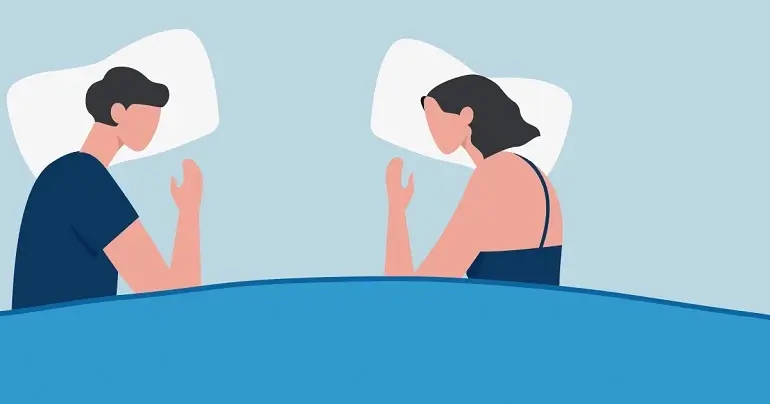Sleep Comfort Month: How Sleep Differs Between Men and Women
2 minute read
Click play to listen to the article, Sleep Comfort Month: How Sleep Differs Between Men and Women.
Quality sleep helps your brain and body recover and re-energize. You can always feel the difference when you’ve had a good night of sleep compared to hours of tossing and turning.
But what factors play into those good or bad nights of sleep? And how may they be different for men and women?
“National Sleep Comfort Month” is recognized in November, and to kick it off we’re looking at the particular reasons that sleep differs for men and women on both sex- and gender-based factors.
Health-Related Sleep Differences Between Men and Women
The National Sleep Foundation recommends that all healthy adults get between seven and nine hours of sleep per night. For any number of reasons, some people struggle to reach that amount or fail to experience quality sleep during those hours.
While all people can struggle with sleep, women have a 40% higher lifetime risk of insomnia than men, and they’re more likely to experience multiple insomnia symptoms. Let’s look at some of the health-related factors that disrupt sleep for both men and women.
More Common in Men
- Obstructive sleep apnea (lapsed breathing while asleep)
- Cardiovascular disease
- Chronic lung problems
- Excess alcohol consumption
- Loud snoring (impacts sleep for self and partner)
More Common in Women
- Restless leg syndrome
- Depression
- Anxiety
- Nocturia (frequent nighttime urination)
- Heartburn and acid reflux
Other Factors Specific to Women
- Premenstrual syndrome (PMS) and premenstrual dysphoric disorder (PMDD)
- Pregnancy, involving hormonal changes that interfere with sleep
- Menopause (ceasing of menstruation), causing changes to circadian rhythm, hot flashes, and night sweats
Lifestyle Differences That Impact Sleep
In addition to the health-based factors above, societal norms and lifestyle choices can also impact sleep.
Because these factors are complex, they won’t be the same for all individuals and don’t always align neatly along sex or gender lines. But they’re important to keep in mind when assessing possible reasons for disrupted sleep.
Lifestyle and Societal Impacts on Sleep
- Caring for elderly relatives
- Providing childcare
- Duties at home like cleaning and maintenance
- Work schedules
- Type of work and the ability to work remotely or take time off
- Pressure to earn income
- Marital status
General Sleep Tips
Remember that sleep needs and preferences can vary wildly from person to person, and you’ll be able to find your own optimized sleep through consistent routines and thoughtful practices. To get you started on your quality sleep journey, here are a few tips you can try out:
- Maintain a consistent bedtime and waking time
- Keep the temperature a bit lower in your bedroom (66–68°F)
- Spend time outdoors and exercise regularly
- Regulate humidity levels with an AprilAire whole-house humidifier or dehumidifier. The optimal relative humidity for overall well-being and comfort is 40–60%
- Avoid distractions like a cell phone next to the bed or a TV in the bedroom
- Prioritize your Indoor Air Quality with an AprilAire whole-house air purifier
